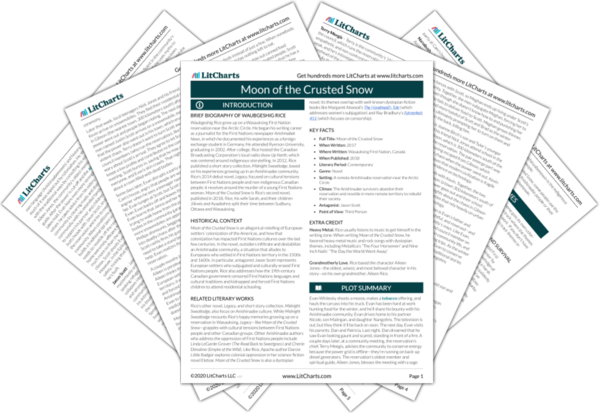The massive electricity blackout, which some characters refer to as an “apocalypse,” symbolizes the oppression and trauma that First Nations people have endured since European settlers colonized the Americas. In Moon of the Crusted Snow, an Anishinaabe community living on a remote reserve struggles to survive a harsh winter after a mysterious catastrophe cuts off their power and communications. The characters eventually learn that the power outage is a global phenomenon—and at the end of the story, the reader learns that the power never comes back on. Many characters struggle with the change in circumstances, which nearly wipes out the indigenous community.
However, Aileen, the community’s eldest member and spiritual guide, is adamant that First Nations people have already lived through many apocalypse-like scenarios: they were displaced after European settlers arrived in the Americas, their children were kidnapped and forced into schooling, and their native languages and customs were gradually eroded. Like the wintry apocalypse in the story, the Anishinaabe’s “world ended” each time they suffered such losses, leaving behind few survivors to carry their traditions forward and rebuild their culture anew. The book’s apocalyptic scenario is a small-scale representation of the centuries-long suffering that First Nations people have endured. This parallel suggests that, like the story’s resourceful Anishinaabe survivors, First Nations people in general are resilient and perseverant despite their fractured past.
The Blackout/Apocalypse Quotes in Moon of the Crusted Snow
Chapter 1 Quotes
It was more than enough for his own family of four, but he planned to give a lot of the meat away. It was the community way. He would share with his parents, his siblings and their families, and his in-laws, and would save some for others who might run out before winter’s end and not be able to afford the expensive ground beef and chicken thighs that were trucked or flown in from the South.
Chapter 2 Quotes
There had been lots of infrastructure improvements on the reserve over the last few years, including their connection to the hydro grid. The old diesel generators that had run their lightbulbs and appliances for decades were still around, but they didn’t need them anymore.
Chapter 3 Quotes
“I thought all these new dishes and towers and stuff were supposed to be better!”
Chapter 5 Quotes
“Yeah, all moccasin telegraph all the time these days.”
Chapter 12 Quotes
“The food’s all gone. The power’s out. There’s no gas. There’s been no word from Toronto or anywhere else. People are looting and getting violent. We had to get the fuck out of there.”
Chapter 13 Quotes
“Some kids started getting angry, yelling that they wanted a shower or hot food […] We thought it was all pretty dumb, so we just went back to our rooms.”
Chapter 15 Quotes
“We’re in a crisis and everyone’s survival depends on cooperation.”
Chapter 16 Quotes
His rough, meaty palm dwarfed Evan’s. The handshake was half goodwill, half intimidation.
Chapter 22 Quotes
“Well, you make sure you spend some time with her. Go for a walk in the bush. When the spring comes, ask her to show you some of the medicines. She'll know a lot now, if she remembers all the stuff from when I used to take her and all the young girls out there. It will be important if we don't get any new supplies in from the hospital down south.”
“You know, when young people come over, some of them […] say that this is the end of the world. The power’s out and we’ve run out of gas and no one’s come up from down south. […] There’s a word they say too […] Yes, apocalypse! What a silly word. […] Our world isn’t ending. It already ended. It ended when the Zhaagnaash [white person] came into our original home down south on that bay and took it from us. […] But then they followed us up here and started taking our children away from us! That's when our world ended again. […] We've had that over and over. But we always survived. We’re still here. And we'll still be here, even if the power and the radios don’t come back on and we never see any white people ever again.”
Chapter 25 Quotes
“Do you kids know the one about Nanabush and the geese?”
Epilogue: Ziigwaan (Spring) Quotes
No one wanted to deal with any more of them. Not now.












